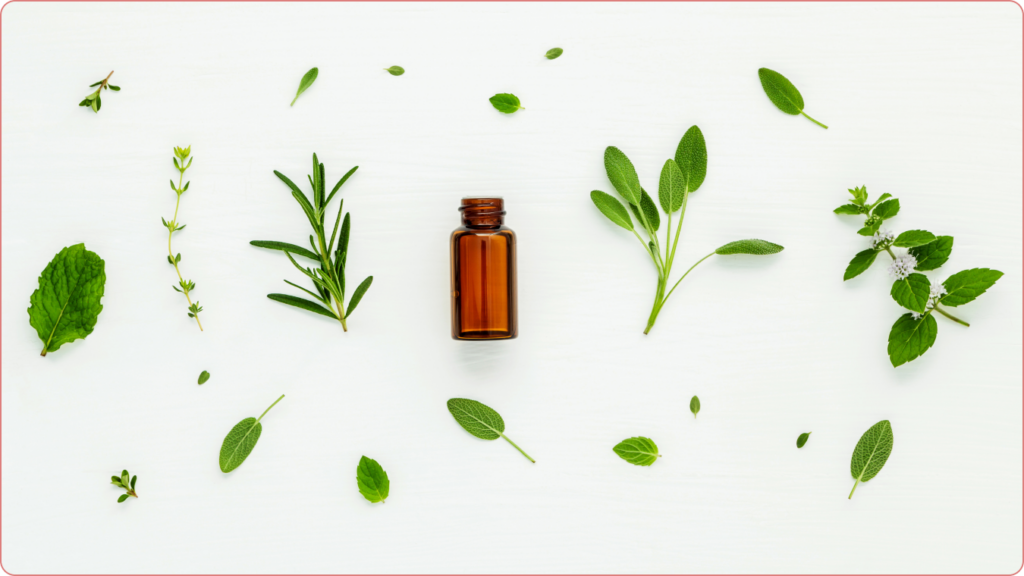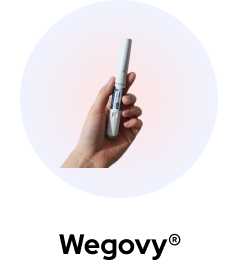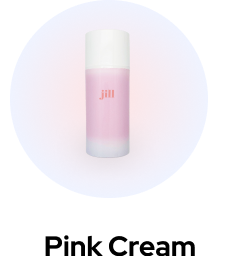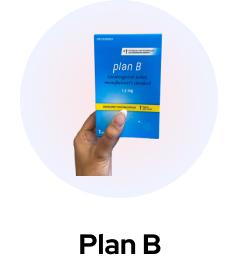Essential oils have been used for millennia to help with a variety of ailments, but have recently resurfaced as a way to replace or augment ‘Western’ based medical solutions. Hair loss, particularly for women, is a condition with some huge affects on mental health. For many of us, the thinning or loss of our hair is a big blow to our confidence, feelings of attractiveness and even our femininity. It’s no wonder women who are experiencing hair loss are looking for solutions.

While there are a few clinically proven and highly effective medications (such as minoxidil and biotin), many women want to supplement those medicines with natural-based solutions. We’ll walk you through the three most promising options to help reduce hair loss, and even regrow your locks: rosemary, lavender and peppermint.
Essential oils are always safe, right?
Essential oils often are very highly concentrated, and the active ingredients in them can have significant effects on your health, as well as potentially interacting with other medications you may be on. Just because they come from plants, doesn’t mean they’re always safe. Always check in with your medical team before starting any new treatment, essential oils or medications.
Rosemary oil: option 1 for tackling hair loss
Rosemary, also known as Rosmarinus officinalis, is a herb native to the Mediterranean. You’re likely familiar with it being used as a cooking spice. This herb has antioxidant, anti-fungal, and anti-bacterial properties.1,2 Also: delicious on roasted potatoes.
Historically, it’s been used for a variety of medicinal purposes such as:1,3
- Alopecia
- Anxiety
- Eczema
- Headache
- Insect repellent
- Muscle and joint pain
How does it work?
Due to limited studies, scientists aren’t 100% sure about how rosemary works to stimulate hair growth. However, they have made some educated guesses:
- Theorised to increase blood circulation 4: this means hair follicles get more nutrients and therefore are more likely to grow and be healthy.
- Decreased dihydrotestosterone (DHT) action5 : this means that it may reduce a hormone, created from testosterone, that encourages hair loss.
Rosemary is known to increase microcapillary perfusion which is a fancy way of saying it can increase nutrient-rich blood circulation to your hair follicles and thus, facilitate hair growth.6
Rosemary has also been shown to decrease dihydrotestosterone (DHT), a more potent version of testosterone. The body creates DHT in your scalp, which should facilitate hair growth. However if there is too much DHT, it can increase scalp pressure which can result in short hair follicles over time, and less growth. If the follicles are feeling squished, then they won’t grow hair.
Rosemary oil can also improve the appearance of your hair by making it silkier and shinier2 as well as helping with greasy hair and dandruff.8
What does the evidence say?
One 2015 study compared rosemary oil with minoxidil 2% as treatment for one of the most common types of hair loss, androgenic alopecia or genetic balding and thinning of hair due to aging.2 The study group of 100 patients was randomly split between the rosemary oil or minoxidil treatments. The study found that 1 mL of rosemary oil applied twice a day was just as effective as minoxidil 2% in significantly increasing hair count by the six month mark.
What did the patients say?
Based on a patient questionnaire, all patients who tried rosemary oil experienced at least a mild decrease in hair loss at the three and six month mark. However, not all patients experienced an increase in hair growth by the six month mark. The lack of hair growth was common to both the rosemary and minoxidil 2% patient groups, so this finding didn’t signify that rosemary oil was any less effective than minoxidil 2%.
Side effects of rosemary oil
Common side effects to both rosemary oil and minoxidil 2% which were experienced by patients in the study include dry or greasy hair, scalp itch, and dandruff.2
Who should and shouldn’t use rosemary oil
Rosemary is not safe for everyone.
It’s best to avoid rosemary as a medicine if any of the following apply to you:1,3,8
- Aspirin Allergy
- Asthma
- Bleeding Disorder
- Breastfeeding
- Crohn’s Disease
- High Blood Pressure
- Pregnant (potential abortive effects)
- Seizure Disorder (high camphor content leads to neurotoxic effects)
- Ulcers
- Ulcerative Colitis
Rosemary can decrease iron absorption and potentially decrease blood sugar as well. If you have an iron deficiency or diabetes, you may be affected and should definitely check with your medical team before starting this treatment.1
Rosemary oil should never be ingested since it can be highly toxic – this is specific to prepared and marketed rosemary oil for hair loss, not the spices you have in your cupboard.3
Drug interactions with rosemary
Rosemary can have multiple drug interactions with other medications or natural health products. Common interactions include, but are not limited to:1
- Aspirin
- Anticoagulants or antiplatelets
- Diabetes medications
- Medications broken down by specific liver enzymes (ie. CYP1A1 and CYP1A2)
Talk to your healthcare provider to ensure rosemary doesn’t interact with your current medications or treatments.
Formulations
With natural health products, it can be difficult to standardize exactly what is inside each product due to less strict regulations in comparison to prescription products. What part of the rosemary plant is being used? The roots, bark, leaves, or flowers? How much is used per dose? When checking labels of rosemary oil, check for minimal ingredient lists, and if it says what percentage of the product is the active ingredient.
Common available products include dried powdered extracts, alcohol tinctures, teas, liquid extract, and volatile oil (for external use only).3
Option #2: What about Lavender oil?
Also native to the Mediterranean, the lavender plant has been used for multiple medicinal and non-medicinal purposes. Notably, lavender has been deemed “possibly effective” for improving anxiety, depression, period cramps, and post-operative pain.10
What does the evidence say?
One 1998 study enrolled 86 patients with alopecia areata, a type of hair loss caused by the body’s own immune system attacking hair follicles.12,13 The study compared the once daily use of thyme, rosemary, lavender, and cedarwood essential oils mixed with carrier oils compared to carrier oils alone. While the group using the essential oil combination product showed improvement, it’s difficult to pinpoint the specific oil which was beneficial. How do we know which oil or if all oils helped, if a combination product was applied?
One 2016 study specifically tested for the hair-growth promoting effects of lavender oil in mice. The study found that mice using lavender oil had significantly increased hair follicles and hair follicle depth by the four week mark, which supports the use of lavender as a hair growth promoting agent.14
Lavender oil for hair loss side effects
When applied topically (i.e. to your scalp), lavender oil may cause some skin irritation. However, it is generally well-tolerated by most people. And you smell incredible when you use it.

Who should and shouldn’t use lavender oil
Lavender should be avoided in the following situations:10
- pregnancy and breastfeeding (due to lack of safety data)
- sedation (before surgery or if taking other sedatives since it can potentially increase sedation)
Peppermint Oil as hair loss option #3
Peppermint is a hybrid herb of the spearmint and wild mint plant species. It’s grown in the Mediterranean, North America, and Europe and has has antibacterial, antifungal, anti-inflammatory, and antioxidant effects.15
What does the evidence say?
In one study, researchers compared 3% peppermint oil to saline, jojoba oil, and 3% minoxidil in mice for hair growth. Peppermint oil resulted in similar hair thickness and length by the 4 week mark in comparison to 3 % minoxidil, which is a common drug used for hair loss. Researchers found that the peppermint oil also resulted in faster hair growth in comparison to 3% minodoxil.16
Side effects of peppermint oil
Other than smelling like a delicious candy cane, when applied topically peppermint oil may cause skin irritation, redness, or burning.15

Who should and shouldn’t use peppermint oil
- If you are pregnant or breastfeeding it’s best to check with your healthcare provider to ensure the specific product you are interested in using is safe for you.
- Peppermint can have multiple drug interactions since it can affect how the liver breaks down medications. It can also interact with cyclosporine, a drug used for suppressing the immune system.
- Peppermint can also interfere with iron absorption.15
Considerations when choosing between rosemary, lavender, and peppermint oil
When choosing between rosemary, lavender, and peppermint oil for hair loss treatment, several considerations should guide your decision:
Scalp and Hair Health Needs
- Rosemary Oil is beneficial for improving circulation and mimicking the effects of hair growth treatments, making it suitable for those specifically targeting hair thickness and growth.
- Lavender Oil offers antimicrobial properties and stress reduction, ideal for individuals with scalp conditions or those whose hair loss is stress-related.
- Peppermint Oil is known for its ability to significantly increase blood flow to the applied area, which can energize dormant hair follicles, making it a good choice for stimulating hair growth.
Sensitivity and Scalp Conditions
Consider any scalp sensitivity or conditions you may have. Lavender oil’s soothing properties can be beneficial for sensitive scalps, while peppermint oil’s intense cooling effect might be too strong for some, potentially causing irritation.
Personal Preferences
The scent and sensation of the oil can influence your choice. If you prefer a calming, soothing fragrance, lavender may be ideal. For a refreshing, invigorating experience, peppermint oil is suitable. Rosemary offers a more herbal and refreshing scent, appealing to those who prefer a more natural aroma.
Method of Application
Your preferred method of application may affect your choice as well. If you’re looking for an oil to incorporate into your regular shampoo or conditioner, lavender, and rosemary are excellent options due to their more general benefits and pleasant scents.
Peppermint oil, given its potency, is better used in small, diluted amounts and might be more suitable for targeted scalp treatments.
Potential Side Effects
Be aware of potential side effects, such as skin irritation or allergic reactions. Always perform a patch test before the full application. Peppermint oil, in particular, should be used cautiously due to its strong concentration.
Desired Outcome and Effectiveness
While all three oils have been associated with promoting hair growth, your specific hair loss condition and the desired outcome might make one oil more suitable than others. For example, if enhancing hair thickness is your goal, rosemary oil might be the most effective choice.
Choosing the right essential oil for hair loss involves assessing your individual needs, preferences, and the specific characteristics of each oil. Regardless of your choice, ensuring proper dilution and application methods is crucial to maximize benefits and minimize any potential side effects.
Safety Tips When Using Essential Oils
When using essential oils, whether for hair care, aromatherapy, or other wellness practices, adhering to safety guidelines is important to prevent reactions. Here are important safety tips to consider:
Dilution
Always dilute essential oils with a carrier oil (like coconut, jojoba, or almond oil) before applying them to the skin or scalp to minimize irritation. A common dilution ratio is 1-2 drops of essential oil per teaspoon of carrier oil.
Patch Testing
Perform a patch test before using a new essential oil: apply a small, diluted amount to a patch of skin and wait 24 hours to check for any reactions.
Avoid Sensitive Areas
Keep essential oils away from sensitive areas, including eyes, inner ears, and mucous membranes, to prevent irritation or discomfort.
Use in Ventilated Areas
When diffusing or applying essential oils, ensure the area is well-ventilated to avoid overwhelming the senses or respiratory system.
Storage and Handling
Store essential oils out of reach of children and pets, and away from direct sunlight or extreme temperatures to preserve their properties.
Consultation with Healthcare Providers
If pregnant, breastfeeding, or managing a health condition, consult with a healthcare provider before using essential oils. Certain oils may be contraindicated in these situations.
Proper Usage and Dosage
Follow recommended usage guidelines and dosages, especially when using essential oils for therapeutic purposes. Overuse can lead to sensitization or side effects.
Quality of Essential Oils
Choose high-quality, pure essential oils from reputable suppliers to ensure safety and efficacy. Avoid oils with synthetic additives or fillers.
Use with Other Products
When adding essential oils to hair care products, ensure they are compatible and won’t react negatively with the product’s ingredients.
Age Considerations
Exercise caution when using essential oils on or around children and elderly individuals, as they may be more sensitive to their effects.
Adhering to these safety tips can help you enjoy the benefits of essential oils for hair loss while minimizing the risk of reactions or harm.
Key Takeaways
- Rosemary, lavender, and peppermint oils show promise in treating hair loss, with rosemary oil being as effective as minoxidil in one study. These oils work through different mechanisms, such as improving blood flow, reducing harmful hormones, and stimulating hair follicles.
- While natural, essential oils are potent and can interact with medications or cause side effects in some individuals. It’s crucial to consult healthcare professionals before starting any new treatment with these oils.
- Patients using rosemary oil reported a decrease in hair loss. However, not all experienced regrowth, a finding consistent across both rosemary and minoxidil groups. This highlights the variability in individual responses to hair loss treatments.
- The choice between rosemary, lavender, and peppermint oil depends on individual needs, scalp conditions, and preferences. Each oil has unique benefits and potential side effects, emphasizing the importance of tailored treatment approaches.
Frequently Asked Questions
Do essential oils work for all types of hair loss?
Essential oils are most effective for certain types of hair loss, such as those related to inflammation or poor scalp health. They may not be effective for all conditions, particularly those caused by genetic factors.
Can I mix different essential oils together for hair loss treatment?
Yes, combining essential oils can enhance their benefits. However, it’s important to ensure the oils are compatible and to always dilute the blend properly with a carrier oil to prevent scalp irritation.
Can using essential oils for hair loss replace conventional treatments?
While essential oils can be an effective supplementary treatment, they may not replace conventional treatments for all individuals. Discuss with a healthcare provider to determine the most effective treatment plan for your specific type of hair loss.
Works Cited
1. Rosemary [Internet]. Natural Medicines. Somerville, MA: Therapeutic Research Center; 2022 [cited 2022 Aug 12]. Available from: https://naturalmedicines-therapeuticresearch-com
2. Panahi Y, Taghizadeh M, Marzony ET, Sahebkar A. Rosemary oil vs minoxidil 2% for the treatment of androgenetic alopecia: A randomized comparative trial. Skinmed [Internet]. 2015 [cited 2022 Aug 12];13(1):15–21. Available from: https://pubmed.ncbi.nlm.nih.gov/25842469/
3. Rosemary – Rosmarinus officinalis [Internet]. Icahn School of Medicine at Mount Sinai. New York, NY; 2022 [cited 2022 Aug 12]. Available from: https://www.mountsinai.org/health-library/herb/rosemary
4. Sagorchev P, Lukanov J, Beer AM. Investigations into the specific effects of rosemary oil at the receptor level. Phytomedicine [Internet]. 2010 Jul [cited 2022 Aug 12];17(8–9):693–7. Available from: https://pubmed.ncbi.nlm.nih.gov/20034774/
5. Murata K, Noguchi K, Kondo M, Onishi M, Watanabe N, Okamura K, et al. Promotion of hair growth by Rosmarinus officinalis leaf extract. Phytother Res [Internet]. 2013 Feb [cited 2022 Aug 12];27(2):212–7. Available from: https://pubmed.ncbi.nlm.nih.gov/22517595/
6. Ezekwe N, King M, Hollinger JC. The Use of Natural Ingredients in the Treatment of Alopecias with an Emphasis on Central Centrifugal Cicatricial Alopecia: A Systematic Review. J Clin Aesthet Dermatol [Internet]. 2020 Aug [cited 2022 Aug 12];13(8):23. Available from: https://pubmed.ncbi.nlm.nih.gov/33178378/
7. Ustuner ET. Cause of Androgenic Alopecia: Crux of the Matter. Plast Reconstr Surg Glob Open [Internet]. 2013 Oct 28 [cited 2022 Aug 12];1(7). Available from: https://pubmed.ncbi.nlm.nih.gov/25289259/
8. Abelan US, de Oliveira AC, Cacoci ÉSP, Martins TEA, Giacon VM, Velasco MVR, et al. Potential use of essential oils in cosmetic and dermatological hair products: A review. J Cosmet Dermatol [Internet]. 2022 Apr 1 [cited 2022 Aug 12];21(4):1407–18. Available from: https://pubmed.ncbi.nlm.nih.gov/34129742/
9. Hamilton JB. Patterned loss of hair in man; types and incidence. Ann N Y Acad Sci [Internet]. 1951 [cited 2022 Aug 12];53(3):708–28. Available from: https://pubmed.ncbi.nlm.nih.gov/14819896/
10. Lavender [Internet]. Natural Medicines. Somerville, MA: Therapeutic Research Center; 2022 [cited 2022 Aug 13]. Available from: https://naturalmedicines-therapeuticresearch-com
12. Hay IC, Jamieson M, Ormerod AD. Randomized trial of aromatherapy: Successful treatment for Alopecia areata. Arch Dermatol [Internet]. 1998 Nov 1 [cited 2022 Aug 13];134(11):1349–52. Available from: https://pubmed.ncbi.nlm.nih.gov/9828867/
13. Alopecia Areata [Internet]. National Institute of Arthritis and Musculoskeletal and Skin Diseases. Bethesda, Maryland: U.S. Department of Health and Human Services; [cited 2022 Aug 13]. Available from: https://www.niams.nih.gov/health-topics/alopecia-areata
14. Lee BH, Lee JS, Kim YC. Hair Growth-Promoting Effects of Lavender Oil in C57BL/6 Mice. Toxicol Res [Internet]. 2016 [cited 2022 Aug 13];32(2):103–8. Available from: https://pubmed.ncbi.nlm.nih.gov/27123160/
15. Peppermint [Internet]. Natural Medicines. Somerville, MA: Therapeutic Research Center; 2022 [cited 2022 Aug 13]. Available from: https://naturalmedicines-therapeuticresearch-com
16. Oh JY, Park MA, Kim YC. Peppermint Oil Promotes Hair Growth without Toxic Signs. Toxicol Res [Internet]. 2014 [cited 2022 Aug 13];30(4):297–304. Available from: https://pubmed.ncbi.nlm.nih.gov/25584150/












 (US)
(US)